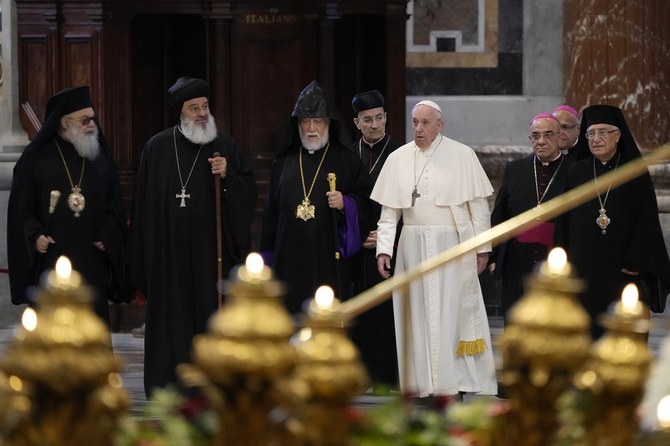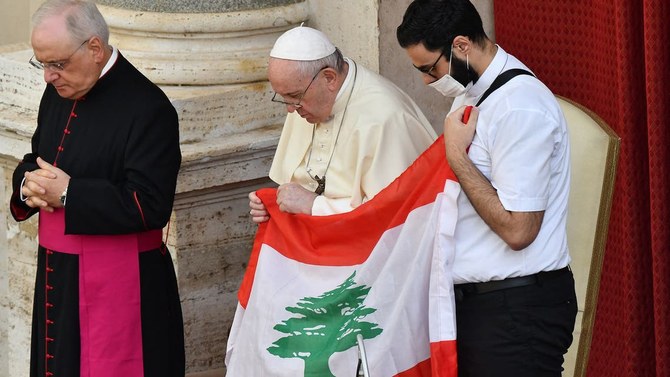ROME: Pope Francis confirmed on Thursday that he wants to visit Lebanon, a country which “is, and must remain, a living project of peace.”
At the end of a day of prayer for the crisis-stricken country, the Pope stressed that its “vocation is to be a land of tolerance and pluralism, an oasis of fraternity where different religions and confessions meet, where different communities coexist, putting the common good before particular advantages.”
The pontiff spoke in St. Peter’s Basilica at the Vatican during a summit with Lebanon’s Christian leaders and addressed the country’s political leadership directly.
“It is therefore essential that those who hold power there finally and decisively put themselves at the true service of peace and not their own interests. Enough to the gains of a few on the skin of so many. Enough to the prevalence of partisan truths over people’s hopes,” the Pope said.
Pope Francis hosted 10 senior leaders of the various Christian churches and communities from Lebanon for a day of prayer and reflection. The Maronite, Greek Orthodox, Armenian, Syrian Orthodox, and Protestant Churches were among those represented.
Lebanon’s deteriorating situation and its future were discussed as the pontiff also implored for the gift of peace and stability.
“Since 2019 that country has been going through one of the world’s most severe economic crises in modern times, which is having serious social repercussions,” Fr. Giuseppe Ciutti, an Italian priest who served in a refugee camp in Qaraqosh, told Arab News.
“We all see this moment of prayer as an important step to help Lebanon remain the home of the Christian-Muslim partnership.”
He also said the Pope’s initiative “does not aim to seek a political solution, but to pray, read the signs of the time, respond to the cry of people in Lebanon and alleviate their suffering.”
Speaking on the crisis in Lebanon, the Pope added: “We appeal to the Lebanese citizens: Do not be discouraged, do not lose your heart, find in the roots of your history the hope of sprouting again.”
Then he called on the country’s political leaders: “You must find urgent and stable solutions to the current economic, social and political crisis in Lebanon, remembering that there is no peace without justice.”
And finally, he launched an appeal to the international community for a joint effort in order to set conditions so that the “country does not collapse, but embarks on a path of recovery.”
The economic and social crisis in Lebanon worsened after a massive Aug. 4, 2020 explosion at a fertilizer storage facility in the Beirut Port which killed at least 190 people and injured 6,000 more. The explosion caused more than SR37.5 billion ($10 billion) in property damage and left some 300,000 people homeless.
“The day of prayer and reflection for the Lebanese is to help revive hope and peace in the country,” Leonardo Sandri, the Vatican’s cardinal for eastern churches, said in a press briefing attended by Arab News.
“The purpose of the day is to ‘walk together.’ The church leaders question themselves, reflect and pray together. They have brought to Rome the cry of their people.”
The Lebanese Christian church leaders in attendance consisted of Cardinal Bechara Boutros Al-Rahi, Maronite Patriarch of Antioch and All the East, Aram I, Catholicos of Cilicia of the Armenians, Ignatius Youssef III Younan, Syriac Catholic Patriarch of Antioch, Michel Kassarji, Bishop of Beirut of Chaldeans and others.
They gathered in the morning at Casa Santa Marta inside Vatican City, where the Pope resides, and then walked to the nearby St. Peter’s Basilica with the church leaders flanking the pontiff.
After they lit candles and prayed before the tomb of St. Peter under the basilica’s main altar, the Pope and the Lebanese church leaders held three closed-door meetings in the Clementine Hall in the Vatican’s Apostolic Palace. The Pope closed the summit with a speech later in the afternoon.
Lebanon has the largest percentage of Christians in the Middle East and is the only Arab country with a Christian head of state, President Michel Aoun. Christians make up approximately one-third of its population.
“Our prayers together are that as Christians and Muslims, we strengthen the values of truth and justice, balance and mutual respect that reinforces our national unity so that we restore to our nation its unique message of coexistence in the region and the world,” Aoun said after Thursday’s proceedings.
This is not the first time Pope Francis has expressed his desire to visit Lebanon, a country he has described as an “example of pluralism in both the East and the West.” A potential visit could occur at the end of 2021 or the beginning of 2022, preferably after the country forms a new government, Vatican officials said.














